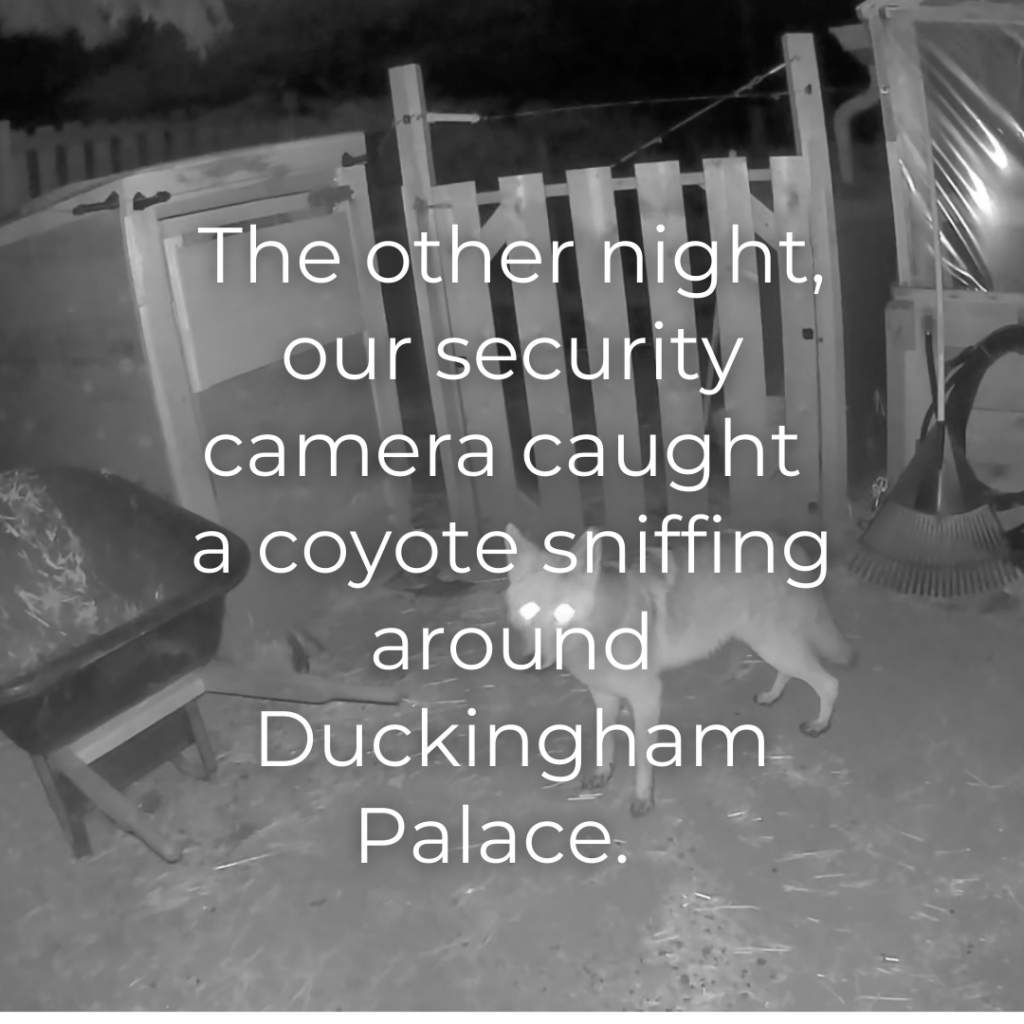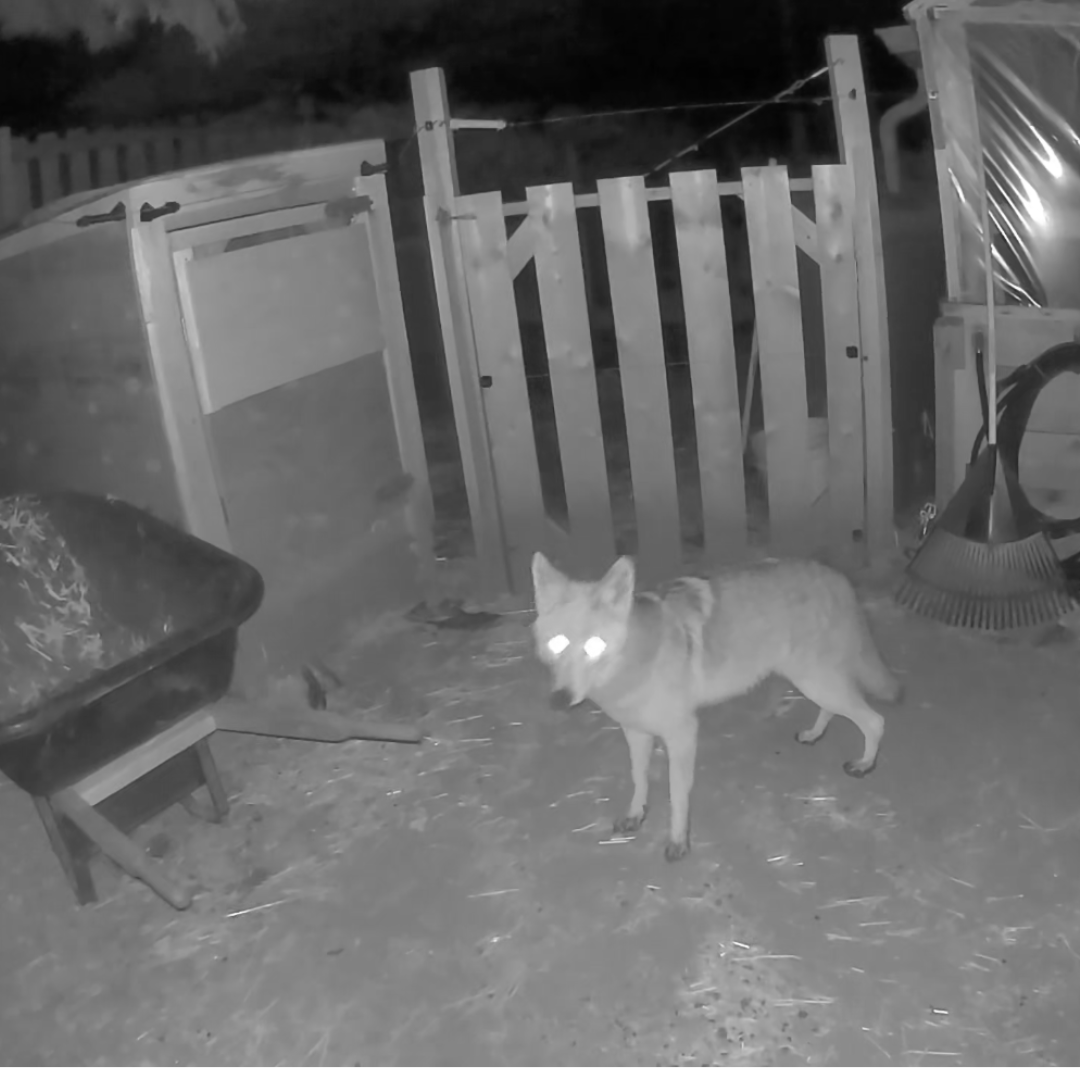The other night, our security camera caught a coyote sniffing around Duckingham Palace. (Yes, that’s what we call our duck house. I never claimed subtlety was my strong suit.)
This sneaky visitor jumped our five foot stone wall with ease and explored the edges of our ducks’ domain. We have electric fencing around their courtyard at night and a fortress-like duck house, but it was a stark reminder that often threats appear in places we thought were safe.
I found myself checking the camera footage repeatedly. Adjusting the fence. Lying awake planning additional protections. My concern for these feathered souls who’ve become such a joy in my life triggered something primal. A vigilance that felt somehow familiar.
And then it hit me. This is how grief shows up too. Not always as obvious tears or the inability to get out of bed (though sometimes it’s exactly that). More often, grief appears as subtle shifts in how we move through the world. As hypervigilance. As the constant scanning for threats in places that once felt secure.
Signs you’re grieving (that no one tells you about)
After decades of both professional work and personal experience with loss, I’ve noticed that grief wears disguises most of us don’t recognize. So I thought I’d give you some of the lesser-known signs that grief might be moving through you:
1. Decision fatigue becomes overwhelming
When my sister Lorraine died, I remember standing in the cereal aisle completely paralyzed. Cheerios or Raisin Bran? It might as well have been a decision about nuclear disarmament. My brain couldn’t process one more choice.
Grief taxes your executive function. The mental energy required to process loss doesn’t leave much room for deciding what to eat, what to wear, or which Netflix show to watch. And if simple decisions suddenly feel exhausting, grief is name of the invisible tax on your cognitive resources.
2. Your body keeps odd hours
Your internal clock usually breaks when grief enters. You might find yourself wide awake at 3 AM, or needing naps at unusual times. After my son Connor died, I woke at exactly 3:17 AM for years. My body was marking time with something my conscious mind couldn’t process.
The body has its own grief language, and disrupted sleep is one of its favourite dialects. It’s not insomnia in the usual sense. It’s your body processing at night what your heart can’t handle during the day.
3. Irritability becomes your default setting
“Why is everyone so LOUD?” might be grief talking.
After my mother died, the smallest irritations felt monumental. Someone chewing too loudly. A driver not using their turn signal. The neighbour’s wind chimes. Everything grated on my last nerve.
Grief takes enormous energy to contain. When you’re using all your resources to just keep standing, there’s nothing left for patience. Your irritability might not be character deterioration as much as grief wearing one of its favourite masks.
4. Your interests suddenly change
The friend who always loved horror movies can’t watch them anymore. The passionate biker who hasn’t touched their bike in months. The gardener whose plants are wilting. Or sometimes the opposite happens. You develop intense new interests that seem to come from nowhere.
After my youngest sister was found dead, I became obsessed with baking. It made no logical sense, but it gave my restless grief somewhere to land.
When grief enters, it typically reshuffles what normally would bring you comfort or meaning. These shifts aren’t permanent failures of character. They’re more your system recalibrating around the hole that loss has created.
5. Time bends in strange ways
“What day is it?” becomes a genuine question, not just small talk.
Grief distorts time perception in ways that neuroscience is just beginning to understand. Hours can feel like minutes. Days can blur together. Or a single afternoon can stretch into what feels like years.
This time-bending is your brain attempting to process something that doesn’t fit into normal temporal understanding. Loss creates its own time zone.
6. Your filters disappear
I was always the diplomatic one, the one who knew exactly what to say and do in every situation. After significant losses, I found myself saying exactly what I thought with zero filtering. Some relationships couldn’t handle this new directness. Others deepened because of it.
Grief has a way of burning through pretence. The social mask becomes too heavy to wear. Some people call it rudeness, but I know it as grief stripping away what’s non-essential when your energy reserves are depleted.
Recognizing grief in others
Just as I’m now watching my ducks with new alertness after spotting that coyote, you might start noticing these signs of grief in those around you.
The colleague who’s suddenly forgetful about meetings. The friend who’s uncharacteristically snippy. The family member who’s developed strange new habits. The neighbour who seems perpetually exhausted.
These could be personality changes. Or they might be grief signatures.
And here’s where it gets complicated: the person exhibiting these signs might not even know they’re grieving. We’ve been taught that grief is about death, funerals, and crying. Not about the promotion that didn’t happen, the friendship that faded, the health that changed, or the future that disappeared.
What to do with this information
As I’ve been enjoying my spring walks with the ducks these past sunny days (such a welcome change from the rain they love but I don’t), I’ve been thinking about protection versus confinement.
I want to keep my ducks safe, but I don’t want to restrict their joy. Their pond-splashing, worm-hunting, wing-flapping essence.
It’s a bit like that with grief too. Recognizing these signs isn’t about pathologizing them or trying to make them go away. It’s more about creating safer conditions for grief to move as it needs to.
If you recognize these signs in yourself, this is my invitation for you to try offering yourself the simple acknowledgment: “Oh, this might be grief.” Not to fix it. Just to name it.
If you recognize these signs in someone else, maybe the greatest gift isn’t advice or distraction. Maybe it’s just quietly making space for whatever’s coming up. Creating safer conditions for their process.
Grief, like those ducks I love watching, needs both protection and freedom. Structure and space. Boundaries and openness.
And sometimes, the simple act of recognition is the perfect balance of both.
P.S. Next week, I’ll be sharing more about why I’m particularly equipped to walk with you through grief. Not because of credentials, but because of what life has taught me through multiple losses. And as Mother’s Day approaches, I’m holding special space for all the complex feelings this holiday can bring.
P.P.S. If you’re noticing these signs in yourself or someone you love, know that they’re not broken. They’re not “doing grief wrong.” They’re having a beautifully human response to loss. And in a world that rushes everything, sometimes the most revolutionary act is simply allowing grief its own timeline.






